The Checker Maven
The World's Most Widely Read Checkers and Draughts Publication
Bob Newell, Editor-in-Chief
Published every Saturday morning in Honolulu, Hawai`i
Noticing missing images? An explanation is here.
Once Again to Knighton
A Short Story

The draughts championship of Wales was coming up in less than a month, to be played, as always, at the Bowling Club in Knighton; and he wanted very much to play there one more time. Indeed, he had played there many a year, and often taking home the trophy, too; and though he had missed the last year or two, he wished to go back, for he knew that he would not have many more opportunities.

He wanted to see his old friends, and gather with them in the Horse and Jockey for drinks and chats in the evening after the games were over. He wanted to stay at Mrs. Bythell’s lovely rooming house, and have her fuss over him as she did with all the draughtsmen, pouring their tea and buttering their scones and wishing each of them luck— as if they all of them at once could win the title!
He wished to walk the narrow alleys and peer in the quaint shops, and see the clock tower and enjoy watching the sun emerge after the inevitable Knighton rain showers. He wanted one more reprise of all those delicious sensations that he had come to associate with the annual competition. But this year, he didn’t know how, or if, it could come to be.

His health, never robust in the first instance, had declined this year, and some said markedly so, although they thought they whispered it softly so he would not hear. But the expressions on their faces and their quick glances in his direction conveyed the message as clearly as words could have done. Yes, he was not doing as well as he once had nor as well as they, or he, would have wished. Yet still, he wished to go to Knighton.
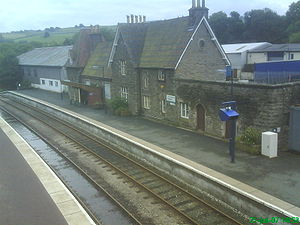
“Five hours on the train, how ever will you stand it!” his wife would exclaim, for even he would admit that it was inadvisable if not downright unsafe for him to attempt to drive. “And the dampness, and the strain! You’ll catch your death, or worse!” she would say, and he would try to imagine her ideas of what might be worse.
His doctor, of course, stood with his wife. “But Mr. Edwins,” he would insist, “as your medical adviser I simply cannot condone such exertion and exposure to the elements, not to mention the risks of infection on public conveyances ...”
It went on and on. When he became stubborn about the idea, he would get sudden calls from his children, at first merely urging him to take care, and then in later calls insisting outright that he not be foolish and strong-headed.
Today, at least, he would have a bit of diversion. His old friend John had made the long trip down from Manchester to pay him a visit, share a beer and conversation, and enjoy a friendly game or two at draughts after enjoying one of his wife’s fine dinners. John, too, was getting older, and couldn’t visit as often as either of them might have liked; but he was grateful and happy to see him, even though the occasions were not frequent.
John had arrived just a bit after one in the afternoon, a little tired out from almost three hours of driving. But the first glass of beer, served in the parlour, soon revived him, and the two men talked at length about a number of topics, although to no one’s surprise the discussion always returned to draughts and draughtsmen. Naturally enough, after a while they began to talk about next month’s tournament in Knighton. And so, he decided to make his plea to John.

“I haven’t played there the last few times, and I’m thinking of going this year,” he said, attempting nonchalance.
John gave him a look that was at once quizzical and knowing. “I’m guessing that your idea isn’t so well received on the home front,” he said quietly, eying the light reflected from his beer glass through the parlour window. He leaned forward a bit on his seat. “You know, Linton, it might not be the best idea, all things considered. It’s a long enough trip and playing several games a day ... well ... your blood pressure and all that ... ”
“There’s many a time I’ve won, you know, and not just in my earlier years,” he interrupted, clearly ignoring the substance of John's remarks, “and I think I’ve still got it in me to play again ... I don’t have to win, you know, just play ... ” His chair creaked as he straightened his back for emphasis. “I’m certain I could do it ... ”
“Indeed, won you have, and more than once,” said John, “and I know you take well-earned pride in that. You don’t need to prove anything to anyone ... you were the best ... everyone knows.”
Yes, he thought, that’s how they know me. I was the best, in the day. But today ... well, old Linton just isn’t up to it any more, pity, but in any case the younger players are coming on strong and time marches on ...
A has-been; a very fine has-been, but a has-been none the less. That’s what they all think.

But of course, he said none of it, just kept his own council, though John surely saw his expression, the hurt and sadness in his eyes, yet John, too, remained silent. They both sipped at their beer, saying little more, until they were called in for dinner.
When John visited, his wife went all-out to put on an excellent meal. This time was no exception, and from the minute he and John tasted the soup, the mood began to lighten and the old conviviality returned. His wife, easily guessing what the matter had been, simply smiled, not feeling the need to do or say more than that.
They all talked of the weather and football and taxes, the state of the world, and all those things that people talk about at dinners among friends. Shadows began to grow longer, and she served them coffee, knowing that they wished to play a few games before John began the drive home; John didn’t like to be out that late these days, and normally would be off before nine o’clock. Even at that, he wouldn’t be home much before midnight.
So the table was cleared of dinner dishes and replaced with a pot of coffee, cups, and the draughts board.
John and he played informally; they’d play some go-as-you-please, and they’d try the odd three-move ballot, often to experiment with interesting lines of play. Little was at stake, after all; and they would say in jest that “the loser pours the coffee.”
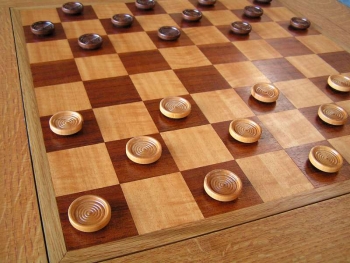
Was it the appearance of the draughts board on the table that turned his thoughts back to Knighton, or was that just an inevitability once dinner was done and his wife had retired to her sitting room?
"John, let's play a serious game," he began, "you know, just for a little practice, before you play at Knighton.
It wasn't hard for John to grasp the real intent. "Linton," he said, "you really should let it go ..."
"Just one game with the clock! It's for you, after all!" he said, knowing full well that it wasn't. "After all, you won't be able to get in a lot of practice ..."
"All right, then, we can play a game with the clock, but you must promise me that you won't then continue to pursue this idea of yours any further, what with your medical advice and so on."
He didn't reply; after all, he was an honorable man and even in small things didn't wish to give his word without meaning in his heart to keep it. So he just got the clock out of an end-table drawer and set it up next to the checker board.

"Sixty minutes a side," he said quietly, knowing full well that this was the time limit used in the tournament.
"Sixty minutes!" John exclaimed. "Why, it will be nigh on time for me to drive home before we're finished, and we'll only have played one game! And besides, it will tire you so and you shouldn't ..."
"No worries, John. You'll enjoy a good game and I can go to bed soon after we're done." Not waiting for an explicit agreement, he set the clock and made his first move. John just shook his head slightly and said no more.
And so they played, John fretting a bit more than usual over his moves, he sipping at his coffee. After a little while, his wife came in to see if they needed anything. Upon seeing the clock and the serious looks on their faces, she said, "Why, whatever is the matter here? I've never seen the two of you with such long looks!"
John shrugged his shoulders, ever so slightly, looking a bit sheepish. "I think Linton's just trying to show me something," he said at last, and, seeing that she looked neither convinced nor satisfied, added, "but he promised me ..."
He sat up quickly, breaking his concentration. Had he become a little angry? "I didn't!" he said with a force that was hardly customary. "I did not make any promises! I only said I would like to play a good, serious game, and for your benefit at that!"
"Yes," John replied, "for my benefit, if you wish. But still, I thought it was a condition that you drop the idea of going to Knighton."
"Well, I never agreed to that!" he said, and there was a catch in his voice as he continued. "All of you ... you're denying me something that you know I want ... it's not right! And I know I'm up to it! You're just ... just ..." but he could not go on. There was a tear in the corner of his left eye and he brushed at it, trying to hide his reaction. But his wife knew him too well.
"There, dear, I'll freshen the coffee and you just play the rest of your game, so Mr. John can drive home to Manchester," she said, and bustled quickly off into the kitchen, as much to avoid further embarrassment as anything else.
And so the game went on. Nearly fifty minutes passed by, with both of them once again completely absorbed in the contest. Soon the game reached a critical point. But the hour was advancing, and John started stealing occasional quick glances at his watch. "Don't you think you should ..." John began, but it was clear that Linton, lost in concentration, was not going to reply.
The position on the board was this:
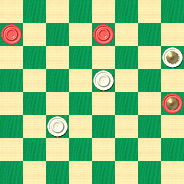
WHITE
White to Play and Win
W:WK12,15,22:B5,7,K20.
It was his turn to play. The patterns of the checker pieces evolved in his mind's eye, and his thoughts swirled with them, thoughts and pieces mingling, intertwining, red and white becoming one. Memories flooded in, combining with men and squares, forming intricate patterns, turning about in a cacophony of color. Until ...

He was twenty years younger and he was playing in for the second or third time in Knighton. Light streamed in from the window next to his table; he could hear the ticking of the clocks in the busy hall, and he was alert, and feeling strong and confident. A few spectators walked about the room, whispering comments about the games to each other and nodding sagely. But he didn't notice. It was the next to last round and a victory would give him a clear chance at his first title.
The game had been long and hard. He had arrived for the second round of the day early in the afternoon after a nice light lunch at Mrs. Bythell's rooming house, and visited for a little while with the other players. "Eh, lad," one of his older friends said, "quite a run of luck you're having this year!" But of course both of them knew it wasn't merely the results of good fortune that had lead to his standing near the top of the chart. And then it was time for him to find his assigned table, greet his next opponent, exchange good-luck wishes, and begin the contest.
So, after more than an hour, all was going well. He briefly regarded his opponent and saw the signs. His opponent was surely thinking that the game might soon end in a draw. He had no idea that Linton was calculating a combination of moves that could spell victory after a long afternoon of gentlemanly combat. Linton was not to be put off. A bit more concentration, visualizing the results of this move, followed by that move ... and there it was. He saw the path, and he would take it ... he reached out his arm ...

A clatter and a crash brought him back to the present day, and he realized with shock that he had dropped his coffee cup onto the floor, where it had shattered into pieces, a brown liquid stain spreading across the carpet. "Are you all right?" John exclaimed in surprise, as Linton's wife came running from the sitting room, her face quickly turning pale, and then just as rapidly growing red.
"What on this earth ..." was all she could say, and then hurried to the kitchen to fetch towels, her dish-washing gloves, and a wastebasket. Giving her husband a rather severe look, she began to clear up the mess. "My carpet!" she said, "I'll need to have it cleaned now!"
"I'm terribly sorry," he said, directing his words to John as much as to her. "This game ... it was so very like one I played in Knighton one time ... and for a moment ..."
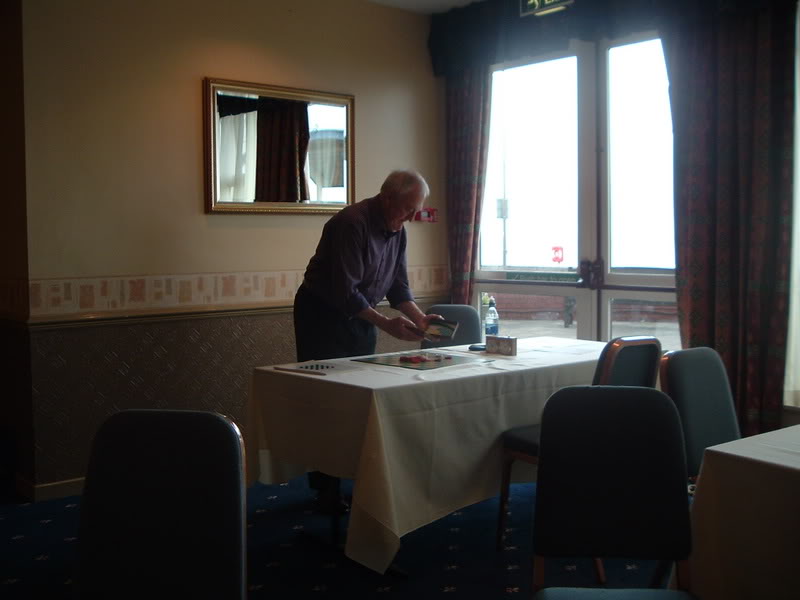
"Oh, enough about Knighton!" his wife cried in frustration. "Your foolishness will be the end of both of us!" John, clearly a bit embarrassed, said quietly, "Perhaps I should be off and driving now ... in any event, our game has been long and has surely become a draw."
"No, no!" Linton replied, "not just yet! Here, here, look at this!"
And so saying, he made a few moves on the draughts board.
John looked down, and then froze where he stood. His mouth open, he sat in his chair and simply stared at the board. Then he shook his head and said in a rather quiet voice, "Why ... that's ... brilliant! Who ever could have seen … "
"Oh, brilliant indeed," Linton's wife began, but John waved his arm as if asking for silence. Then, realizing what he had done, he said in an apologetic tone, "I don't mean to be rude, Mrs. Edwins, really I don't, but this is just astounding. Most amazingly, your husband has produced victory in a position that I took for a certain draw!"
Mrs. Edwins did not seem terribly impressed by this as she finished picking up the broken pieces of china and blotted up the rest of the coffee from the carpet. The two men went over the final moves once again, and there was no doubt as to the outcome. Linton had won.
John was smiling and shaking his head at the same time. "Truly amazing, it is!" he said. "Whoever would have thought ..."
His expression changed. "I hardly can believe what I'm about to say," he stated, "but, Mrs. Edwins, I think we really must let Mr. Edwins go to the tournament at Knighton. I knew that your husband is a fine draughtsman, but I had no idea ... his skills have grown, not decreased ... it would be a shame for him, indeed, a loss for all of us, if he were not to take one more turn at vying for the championship."
"But ... but Mr. John, his doctor says ... and you saw what just happened, he's so unsteady ... and you yourself were just saying ..."
Linton, seeing a chance, wisely enough did not speak as the dialog spun its way out.
"I think ... I think he was only lost in thought," John said, and was that a wink that he directed at Linton? "And besides, if we all looked after him ... I know, yes, I was opposed to the idea perhaps as much as you are, but look at this!" and he pointed meaningfully toward the draughts board. "Anyone who can produce play like this ... !"
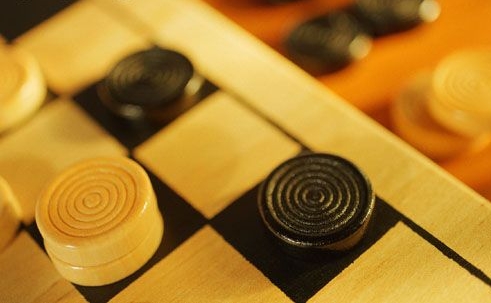
"Well, I'm surely no draughtsman," she replied, "and whatever you're showing me, I can't fathom the meaning." She paused for a moment. "Do you really think he should ..."
Linton could keep it in no longer. "Yes, yes!" he said. "I can do it! Listen to John, please! I know I can play again!"
"Mrs. Edwins, I really must be driving home now," John said, "but I do surely hope you'll give it consideration. As much as it surprises me to do so, I'm adding my own plea to that of your husband. Please do allow him to play, just this one more time."
Was she beginning to soften? "Well, well, now, I suppose I should think on it overnight, then. But no promises, and you, Linton, don't get your hopes up too high only to be let down!"
John had put on his sweater and was headed toward the front door, Linton and his wife following behind. Thank-yous and good-byes were said as always, but Linton's thoughts were elsewhere. After so many decades together, he knew his wife well, and he knew what it meant when she was going to "think on it overnight."
He would be going to Knighton this year, and he only had to wait until morning for his wife to tell him so.![]()
For the solution to the diagrammed position, click on Read More.
[Read More]Thanksgiving: Time for Coffee and Cake
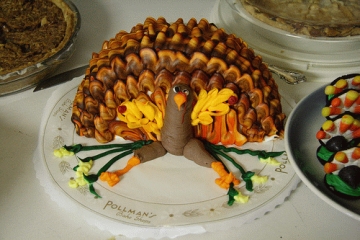
It's Thanksgiving time in the United States, and as we remark on each such occasion, this has got to be our favorite holiday, combining as it does food, family, and an air of happy contentment.
During this season, we also like to hearken back to the first days of our Checker Maven columns, which featured an excellent "coffee and cake" problem. Such a problem, you might recall, is one that is so good you'd be willing to bet your checker friends a serving of coffee and cake that they can't win it.
This year's "coffee and cake" problem is a fine one indeed. As we see below, White is up a man but is going to have to work for the win.
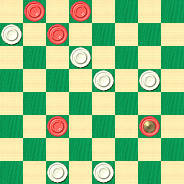
WHITE
White to Play and Win
W:W31,30,16,15,10,5:BK24,22,6,2,1.
Can you find your way to the table, so to speak, where coffee and cake await? Or will you be treating your friends instead? Give it a gander, and here's our Thanksgiving treat to you: if you can solve it, and if some day we should meet in person, coffee and cake are on us. When you're ready, click on Read More to check your answer.![]()
Good Mental Gymnastics
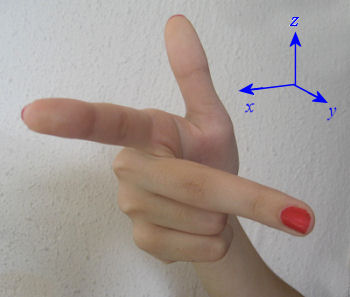
In our elementary calculus classes, we all learned the right-hand rule, as demonstrated in the photo above, for finding a vector cross product. It's just a bit of simple mental gymnastics. (And, no doubt, we all learned that old, tired joke, "What do you get when you cross an elephant with a grape?")
Checkers, of course, provides its own excellent form of mental gymnastics, and no calculus classes, be they basic or advanced, are required. Today's problem in our continuing Checker School series will give us a good workout with a practical ending. The position is attributed to a Mr. D. Gourlay, and while it may be old, it is far from tired.
WHITE
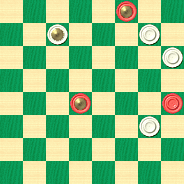
BLACK
Black to Play and Draw
B:WK27,25,21,9:BK30,K15,13.
Black is a man down; obtaining a draw is going to require some real thought. Exercise your mind, find the saving moves, and then exercise your mouse finger by clicking on Read More to see the solution.![]()
A Pretty Slip (Shot)
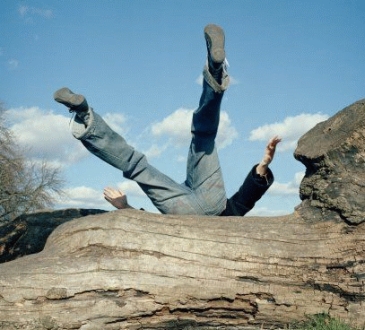
We certainly hope the young lady in the photo wasn't hiking alone, as she's just taken a pretty little slip and might need a bit of help. And indeed, we're going to hear about another kind of slip in today's column--- a slip-shot, that useful and often winning checker maneuver wherein our man "slips" behind an enemy man while our opponent is distracted by a compulsory jump elsewhere on the board. Our example comes from Willie Ryan's Tricks Traps & Shots of the Checkerboard and Willie will explain it himself.
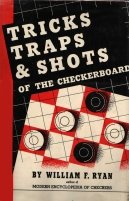
"Throughout my book, I have tried to emphasize the importance of stroke strategy in overpowering losing moves. Here is a well-known Edinburgh development in which the losing move at A (15-19) can be beaten only by driving black into a well-concealed slip-shot finale.
| 9-13 | 20-11 | 15-19---A |
| 22-18 | 8-15 | 27-23* |
| 11-15 | 28-24 | 12-16---B |
| 18-11 | 4-8 | 30-25 |
| 8-15 | 24-20 | 10-15 |
| 21-17 | 8-11 | 25-21---1 |
| 13-22 | 29-25 | 6-10---2 |
| 25-11 | 5- 9 | 32-28 |
| 7-16 | 25-22 | 2-7---3, arriving |
| 24-20 | 1-5 | at the |
| 3-8 | 23-18 | diagram. |
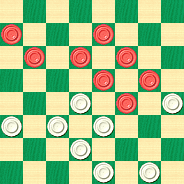
WHITE
White to Play and Win
W:W18,20,21,22,23,26,31,32:B7,5,9,10,11,15,16,19.
A---Standard play to here. The text move loses; the only way white can beat it is by forcing black into the stroke that follows. The correct move at A is: 9-13*; then 27-23, 5-9, 20-16, 12-19, 23-7, 2-11, 26-23, 13-17, 22-13, 15-22, 32-28, 9-14, 28-24, 14-17*, 23-18, 17-21, 24-19, 22-25, 31-27, 25-29, 27-24, 29-25, 24-20, 25-29, 30-26, 29-25, 26-22, 11-15, bringing about a draw. J. W. Jacobson.
B---Nothing better. If play continues with 2-7, 23-16, 12-19, then white will win with 32-28, 9-13 (10-14, 26-23, 19-26, 30-23, 6-10, 31-27, 9-13, 18-9, 5-14, 22-18, 14-17, 23-19, 17-22, 27-24 white wins), 31-27, 5-9 (6-9, 27-23), 27-24, 10-15, 26-23, 19-26, 30-23, 13-17, 22-13, 15-22, 23-19, 7-10, 19-16, 11-15, 24-19, 15-24, 28-19, etc. Wm. F. Ryan."
1---A blunder. We think Willie may have missed this one, as KingsRow now rates the position dead even, and gives 32-28 instead as the move to hold the winning edge---Ed.
2---But this gives the win back; 9-13 would draw---Ed.
3---Loses quickly, whereas 10-14 would have been much better, though still not enough to draw. However the text move leads to a very flashy finish, as you'll see when you work it out---Ed.
Find the winning moves in the diagram above, but don't slip up! Instead, when you've worked out your answer, slip your mouse over to Read More to tumble upon Willie's solution.![]()
The 4-Stroke
Once again, we thought we were fresh out of puns on the word "stroke." But then we found this:

Now, we know about checker strokes, and we know about checker engines (for computers), but we've yet to see a checker stroke engine, much less a 4-stroke engine. So instead we'll just go ahead and present you with one of our top of the month stroke problems, and let you use your own mental engine to come up with the solution.
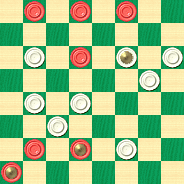
WHITE
White to Play and Win
W:W9,K11,12,16,17,18,22,27:B1,2,3,10,25,K26,K29.
While not necessarily simple, this one is easier than some of the others seen in our columns. Chug away on all cylinders and when you're ready, click on Read More to open the valves leading to the answer.![]()
Hopeless

Sometimes we feel like we've reached the end of our rope and there is just no hope and nothing can be done any longer. It happens to us all at times, and then we need to draw on whatever internal and external resources we have at hand, and try to pull ourselves back up.
Consider our heroine above, who wishes things could have begun differently, and presumably led to a different outcome. Surely, she must have been referring to a game of checkers in which she misplayed a difficult 3-move ballot. Well, cheer up, young lady, you can always play another game and improve on your results.
This week's problem selection certainly belongs to the seemingly "hopeless" category. Consider the position below.
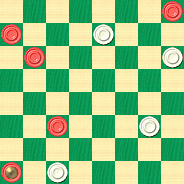
WHITE
White to Play and Draw
W:W7,12,24,30:B4,5,9,22,K29.
White is down a man and looks to be in rather bad shape. Is it truly hopeless? Should White just throw in the towel and resign?
This problem is an object lesson in the wisdom of the old adage, "Never give up hope." In fact, White can get a draw if he maintains his courage and composure. Can you find the right moves? Hope springs eternal! When you're satisfied with your answer, click on Read More to see the solution.![]()
X the Unknown

Wouldn't it be nice if, during one of our games, it was our turn to play and suddenly a sign flashed, "Black to Play and Win"? We'd then know to look extra hard for that winning move, and we'd have a good chance of actually finding it.
But real life is not so user-friendly. There are no flashing signs telling us what to do next. If there's a win on the board, we have to both know it's there and find it. Every position is an "X the Unknown" to be solved on our own.
That's why problems with terms like "White to Play, What Result?" are at once frustrating and practical. Frustrating, in that we'd at least like an idea about what we're supposed to do. But practical, in that they mirror the real world of cross-board play, with an unknown result awaiting us at each and every move.
Today's problem is taken from the real world of master play, from a long-ago cross-board game. Can you discern the result and find the right line of play? We're offering you no further information. Here's the position.
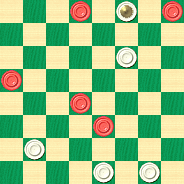
WHITE
White to Play, What Result?
W:W32,31,25,11,K3:B23,18,13,4,2.
Can you master the unknown, or will you be X-ed out? When you've worked your way through, though, it's no unknown that clicking on Read More will show you the solution.![]()
The Leaves Fall Quickly in the Fall

How fast do the leaves fall in the Fall? It seems like the season is all too brief. There is a short period of spectacular color and then, suddenly, it's over, and in much of North America we're left with nothing but a big raking and cleanup task.
For our October speed problem, we've chosen to mimic the season by presenting a problem which goes by pretty quickly. One minute the clock starts, and then, seemingly in seconds (actually it is in seconds), time is up.
Of course this means that the problem is in the easy category (and we've seen problems like this before), so we'll expect you to solve it in 15 seconds. When you're ready, let your mouse fall on the link below.
October Speed Problem (easy; 15 seconds)
To drop down to the solution, simply flutter over to Read More.![]()
Secret Hideaway

Don't tell anyone, but The Checker Maven has a secret hideaway.
Unfortunately, it isn't a bungalow tucked away on a remote tropical island, much as we might wish; but for a checker fan, it might be something even better: we have a hidden stash of checker problems.
No, we're definitely not telling. But in our weekly columns, little by little we'll share some (maybe even all) of the contents of our secret checker problem hideaway with you. Today, we'll start with a deceptive little situation of the "what result?" variety. Take a look at the diagram below.
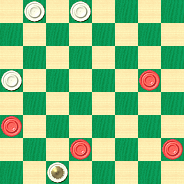
BLACK
Black to Play, What Result?
B:W32,31,20,K3:B17,12,7,5.
We can't offer a week's vacation in Paradise as a prize for solving this one; we can only promise you self-satisfaction and a feeling of accomplishment. Tease out the secret and then click on Read More, which will reveal the solution's hideaway.![]()
Labor Day Race, 2009

The runners above are taking part in an event called the Saguaro Race, held on Labor Day weekend in Arizona. There's a choice between a more serious eight-mile event, or a two-mile "fun" event. Given the heat of the Arizona desert, and our less than stellar endurance, we know which one we would opt for--- but to each his own, and we're certain that a good time will be had by all.
As our own celebration of Labor Day, the holiday set aside for recognizing the ordinary worker who makes America great, we offer our own race, and we promise that it's much less taxing than the Saguaro event. It's a race against the Javascript clock to solve a checker problem before time runs out. The problem will tax your brain, but not all that much, so we'll give you 30 seconds to figure it out. (The Saguaro participants, no matter which event they choose, can't possibly finish that fast!)
Click on the link below to display the problem, then come back and click on Read More to see the solution.
September Speed Problem (moderately easy, 30 seconds)
![]()
The Checker Maven is produced at editorial offices in Honolulu, Hawai`i, as a completely non-commercial public service from which no profit is obtained or sought. Original material is Copyright © 2004-2025 Avi Gobbler Publishing. Other material is public domain, as attributed, or licensed under Creative Commons. Information presented on this site is offered as-is, at no cost, and bears no express or implied warranty as to accuracy or usability. You agree that you use such information entirely at your own risk. No liabilities of any kind under any legal theory whatsoever are accepted. The Checker Maven is dedicated to the memory of Mr. Bob Newell, Sr.

